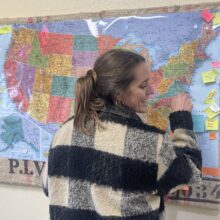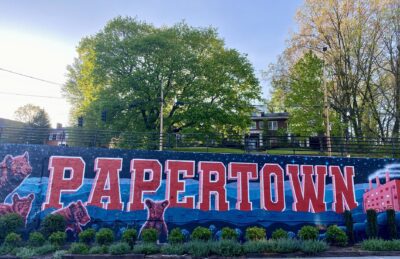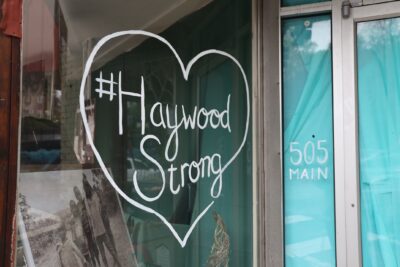Share this story
|
|
The closing of a paper mill by the numbers
Click here for full audio transcription
Cheyenne McNeill: I am Cheyenne, a reporter with EducationNC. Our organization was established to be an independent source of news – providing data and analysis about education for the people of North Carolina. In short, we tell the stories happening in our state’s classrooms and involving our state’s students.
This story starts in Western North Carolina, with the closing of a paper mill that was the center of town for over a century. True to our foundation, we went to the schools to understand the impact of this closing. We talked with the superintendent, a principal, and a teacher in our first episode. We learned about their community and what it means to be a mill town. We listened as they spoke of their fears, and how when faced with tragedy again and again, the town bounces back. You can find that episode in this feed or at EdNC.org.
Zeb Smathers, mayor of Canton, N.C. says it best.
Zeb Smathers: I realized literally in the hours following closing, that being a mill town is not necessarily about the machines or the building. It always has and always will be about the people, the relationships, the character, the grit, that blue collar swagger, finding ways to fix solution and carry on production when the challenges are high. It’s the audacity to carry on. If that’s what makes you a mill town, then I still think we can be a mill town without having the mill.
Cheyenne McNeill: So the question remains, what will Canton look and feel like when the steam stops rising from the stacks? Pactiv Evergreen is the largest employer in Haywood county, followed by the school district. The two are inextricably linked. If current employees of the mill need to move out of the county for jobs, their families will follow. Haywood County Schools would then be looking at a decrease in average daily membership, what is known as ADM. And in North Carolina, this is how school districts are funded.
This is just one example of the economic impact of the paper mill closure. David Francis, Haywood County economic development director, explains the greater picture.
Davis Francis: We were talking about it being a ripple effect. And, you know, now I believe it’s a wave effect. When I was describing some of the things we’re going through somebody said, you might be really talking about a tsunami.
Cheyenne McNeill: Francis says Pactiv Evergreen is the largest manufacturer in Western North Carolina. Here are some projected impacts of the mill closure, by the numbers. According to Francis, the mill closure is putting around 1,900 jobs at risk in Haywood County.
This includes about 900 workers lost directly due to the mill closure and 983 other jobs in the county that will also be impacted.
David Francis: So, basically, for every job, there’s another 1.1 jobs that are affected by the mill closing.
Cheyenne McNeill: The wave starts when you zoom out of Canton. The mill was responsible for around 30% of all wood products in the state of North Carolina. It bought $200 million worth of wood chips annually. Blue Ridge Southern Railroad of WATCO has 32 employees, and 72% of their business was with Pactiv Evergreen. It is estimated that another 4,000 jobs in logging and wood chip manufacturing could be impacted regionally.
Francis said the economic loss could exceed a billion dollars once everything is said and done.
Here’s Francis again:
David Francis: Not just huge for Haywood County, but it’s huge for western North Carolina.
Cheyenne McNeill: Another challenge Canton faces with the mill closure is waste water treatment. The town is still operating off of a 1964 agreement, where the mill handles waste water treatment for the town. Pactiv Evergreen has agreed to continue this responsibility for two years. Canton will have to take over logistics and foot the bill thereafter. Francis estimates permitting and building will be a five-year process.
David Francis: That’s one of those things where I remind everybody, if we’re not working on this every day, that’s not going to get done.
Cheyenne McNeill: So far, we’ve got job loss at the mill and throughout the region, a decrease of spending in the county, and a multi-year process to build and transfer waste water treatment responsibility to the town. What is one thing the town has gained in the announcement of the mill closure? Ownership of its cherished whistle.
*whistle*
Here is Mayor Zeb Smathers again.
Zeb Smathers: But I wanted the whistle. Because I knew of the importance growing up here. But also knew that we all need reminders from time to time. If you do that, it’s much more than just a simple whistle. None of us want to watch the ones we love and the things we love disappear, so this is all we have.
Cheyenne McNeill: Folks in Canton say when you hear the whistle, you know someone’s heading home from work, heading to lunch, or heading into work. Smathers says he knows how important the whistle is to the town. So, knowing they’d receive the whistle from Pactiv Evergreen was a bright spot during difficult times. Like we’ve heard previously, Smathers can’t imagine how his son and other children in the town will grow up without the mill and everything associated with it.
Zeb Smathers: It is baffling and numbingly weird and sad that he and his fellow children, friends, boys and girls are going to grow up in a community… they won’t remember any of it. They won’t remember the smell. They won’t remember the whistles. They won’t remember the trains.
Cheyenne McNeill: Smathers believes Canton will rally. He says folks will support each other and do what they can to see the town out on the other side of the mill’s closing.
Zeb Smathers: I hope I will live long enough to see the before and after. The old Canton and the new Canton.
Cheyenne McNeill: Francis says the town has been through plenty – comparing the community to Job, a biblical story of a man who endures difficult trials and suffering, but keeps his faith.
Like Job, Francis believes Canton will bounce back.
David Francis: There’s too many damn good people, that these things keep happening to. And I know these folks are gonna be resilient and we’re gonna bounce back, but it’s gonna take a long time.
Cheyenne McNeill: And on May 24, 2023, the last whistle blew at Pactiv Evergreen – about two weeks earlier than expected. Still, Smathers looks forward to rebuilding the town.
Zeb Smathers: I think in some regards, I want people to know that we survived. Not just now but in the past. That we made it through. As we find a way forward, we say these people matter, these principles matter. That we do it the right way. We honor the river and the environment. And we build back in a way that is sustainable, and respectful.
Cheyenne McNeill: EdNC is doing a series of stories called The Power of Papertown, where we highlight what’s happening in Canton. You can find all of our coverage at EdNC.org.
In this episode, we talk with Zeb Smathers, mayor of Canton, and David Francis, Haywood County economic development director.
Smathers said he is a “product of Papertown.” He grew up here and currently works with his dad in a building that was his grandfather’s grocery store. He was at the helm during the most recent flood and has led the “Canton Comeback” charge. In this episode, Smathers reflects on what the town will be like without the mill.
Francis speaks to us about the economic effects of the Pactiv Evergreen mill closure.
We were talking about it being a ripple effect. And, you know, now I believe it’s a wave effect. When I was describing some of the things we’re going through, somebody said, ‘you might be really talking about a tsunami.’
David Francis, Haywood County economic development director

Both relay the same sentiment in the end: the people are resilient, and they will bounce back like they always have.
Find other episodes of The Power of Papertown here.
Behind the Story
The Power of Papertown is a series of audio stories highlighting the closure of the paper mill in Canton, North Carolina.
Cheyenne McNeill and Caroline Parker did the reporting for this story. Cheyenne produced and narrated the audio stories.
In this episode, you heard from Zeb Smathers, the mayor of Canton, and David Francis, the Haywood County economic development director.
The intro and outro music was recorded from a session at the Haywood Junior Appalachian Musicians (JAM) after school program.
The artwork for this series was created by Lanie Sorrow.





